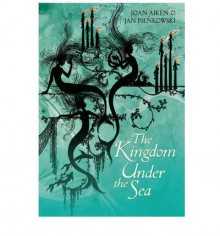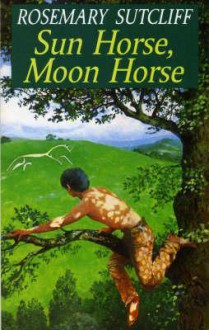
“It was dusk–winter dusk. Snow lay white and shining over the pleated hills, and icicles hung from the forest trees. Snow lay piled on the dark road across Willoughby Wold, but from dawn men had been clearing it with brooms and shovels. There were hundreds of them at work, wrapped in sacking because of the bitter cold, and keeping together in groups for fear of the wolves, grown savage and reckless from hunger.”
So begins The Wolves of Willoughby Chase, the first book in the Willoughby Chase series. I love this opening–there’s a kind of delicious thrill about it and the way it starts off quiet and calm and then turns into something very different. And it serves as a good summary of the world of the books, which looks a great deal like our Georgian/Regency England…except not quite. There are those wolves at the end of the paragraph, wolves that run freely through the countryside.
In fact, Aiken has created a wild alternate history, where Hanoverians in support of Bonnie Prince George are trying to overthrow the Stuart King James III. We see very little of the political aspect in this book, but it becomes a major theme and plot point in the rest of the series. In this first book, what we mostly get is a world that seems so much like our own, but a little bit slantwise.
Oddly enough, my personal history with these books doesn’t start here at all. My grandparents gave me a copy of Nightbirds on Nantucket when I was about 12, and I read that one first (and fell in love) and then went back and read the earlier books. And I do love the first two books! But at the same time my experience is very much filtered through the fact that my experience of these stories began with Dido Twite, who doesn’t appear here at all.
Instead, this is the story of Bonnie and Sylvia, the cousins who get thrown together when Bonnie’s parents invite Sylvia to live with them at Willoughby Chase and then depart for a long ocean-voyage, leaving them in the care of a distant relative none of them have ever seen before.
SHOCKINGLY, this does not go well.
Bonnie and Sylvia are both almost impossibly sweet characters. Bonnie is a little less so, but she’s also a privileged and slightly spoiled child, who is less saintly because she can get away with it. Sylvia seems too good to be true–quite literally. The other main character is a gooseherd name Simon who is an orphan and escaped from a cruel farmer. The Simon of later books is a kind-hearted and relatively fleshed-out character; here he’s more idealized. (We don’t see Bonnie or Sylvia again, as far as I remember.)
As is generally the case in Aiken’s books, the adults here are mostly either evil or naive and helpless. The sole exceptions are James the footman and Pattern, Bonnie’s maid, who try to look after the girls and later save them from the orphanage and Miss Slighcarp. But even in their cases, there’s an odd element of ineffectualness.
And then there are the Slighcarps and Miss Brisket, who represent the other kind of Aiken adults–the scheming ones, who try to take advantage of the well-meaning naive adults. These are the adversaries the children have to overcome, by sticking together and finding a way out of the mess. (Usually this means finding the one adult who will listen to them.) Miss Slighcarp especially is genuinely awful, as is Mr. Slighcarp/Grimshaw–in a less overt but even more realistic way.
What’s interesting to me about this book in particular is that, in a certain light, it looks like a familiar kind of morality tale. Bonnie and Sylvia are well-born, true-hearted, brave, and kind. Therefore, as is right, they eventually triumph. And yet, all through the book there’s also an ever-present sense of real danger. The triumphant ending is not assured. So although the story has the outward trappings of an uncomplicated “good children get their reward” trope, there’s a kind of subversiveness that’s lying just behind it. Aiken keeps reminding us about the howling wolves, and the dangers of the Slighcarps and Briskets of the world, and in doing so she makes it very easy to imagine the ways the story could go wrong.
On the other hand, the subversiveness only goes so far–I found myself frustrated at several points, with the assumption of Sir Willoughby as a good landowner who all the servants are happy to work for. There’s a lot of “dear Miss Bonnie” from the staff, who seem uncommonly attached to her. And finally, there’s an uncomfortable romantic view of Simon’s situation and life, which does express his general goodnatured optimism, but which also has a ring of “he’s happy with nothing, why aren’t you?”
It’s not that I expect some sort of political tract. I’m not even sure I think Aiken believed what she was writing, exactly. (The later books move away from this to a large degree.) Rather, I think that because she’s still writing within a certain type of story, and because she doesn’t quite have the experience or vision to reach beyond it yet, she’s still caught in this slightly antiquated sense of class and roles.
I do also have to say that on this reading I found the resolution oddly unexciting, especially considering the fact that there are literal wolves involved. It’s all a bit handwavey. Aiken is fond of ending books with a sudden surprise (in this case the reappearance of Bonnie’s parents), but in this case I didn’t feel there was much tension to begin with.
However, it is very satisfying to see Miss Slighcarp get her comeuppance.
All in all, I can’t quite say that this is my favorite book of the series–it’s clearly a first book, and Bonnie and Sylvia have nothing on Dido, or even Sophie. But it is certainly a memorable beginning.

 Log in with Facebook
Log in with Facebook 









